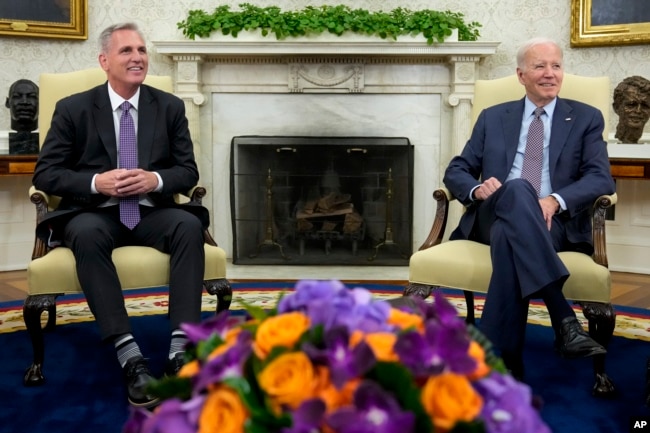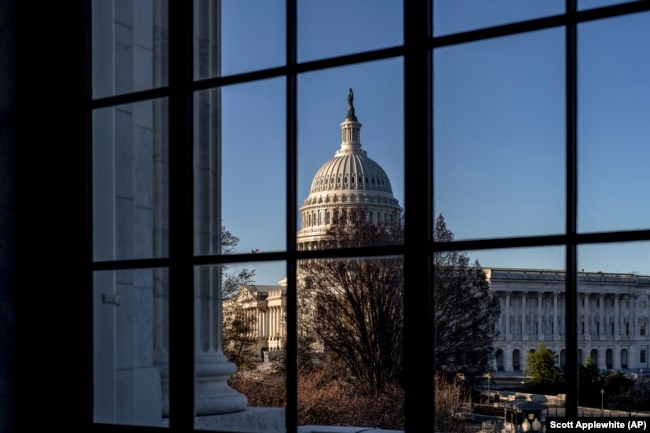Failure of US to Pay Debt Raises Fears of
Financial Crisis

The United States government has a history of paying its bills on time.
Many people, however, are worried about what would happen if the U.S. defaults on debt that it owes lenders.
Default means to fail to do what rule or law requires. In finance, it means being unable or unwilling to pay back loans.
“No corner of the global economy will be spared” if the U.S. government defaulted and the problem were not solved quickly, said Mark Zandi. He is chief economist at Moody’s Analytics, a risk advising business.
The Associated Press reports that Zandi and two of his coworkers suggested that, even if the U.S. did not pay its debt for only a week, 1.5 million jobs in the U.S. could be lost.
If the default were to last longer into the summer, Zandi’s team’s research suggests 7.8 million jobs could be lost. And they estimate a huge decrease in the stock market would cause a $10 trillion loss in household wealth.
Public debt limit
The reason people are talking about default is because U.S. law limits the amount of debt securities the government can hold at one time. It is called the public debt limit.

President Joe Biden meets with House Speaker Kevin McCarthy to discuss the debt limit in the Oval Office of the White House, May 22, 2023. (AP Photo/Alex Brandon)
House Speaker Kevin McCarthy, who is a member of the Republican Party, has been meeting with President Joe Biden, a Democrat, to discuss the problem. The two met on Monday. Republicans want to pull back government spending increases and place limits on future spending. In return, they have said they would increase the debt limit, which is what the president wants.
Congress has raised, changed, or extended the borrowing limit 78 times since 1960, most recently in 2021.
The U.S. government borrows money from the public and from other countries by offering bonds and other securities that investors buy from the U.S. Treasury.
The public buys the securities because they pay interest or increase in value over time. But, if the U.S. defaults, that might mean some investors might not get money the U.S. government owes them.
Treasury Secretary Janet Yellen has warned that the government could default as soon as June 1 if lawmakers do not raise or suspend the borrowing limit. She called June 1 a “hard deadline,” meaning an important time limit.

FILE - The U.S. Capitol is seen through a window in the Russell Senate Office Building, March 15, 2023. (AP Photo/J. Scott Applewhite)
US Treasury securities
Governments and international businesses use U.S. securities to secure credit and protect against bank losses. They also use and keep U.S. dollar securities for trade.
Because of the trust in U.S. securities, international bank officials give U.S. government debt a risk rating of zero. Foreign governments and private investors hold nearly $7.6 trillion of the debt. That is about 31 percent of the U.S. securities in financial markets.
The high demand for the U.S. dollar makes it more secure than other currencies. Because of demand around the world, the U.S. can borrow money.
U.S. dollars make up 58 percent of all foreign money held by the world’s central banks. The International Monetary Fund says the euro is second, at 20 percent, and China’s yuan is less than three percent.
Researchers at the Federal Reserve have said that from 1999 to 2019, 96 percent of trade in the Americas used U.S. dollars. And 74 percent of trade in Asia used dollars.
Buyers in some weak economies demand payment in dollars instead of their own country’s currency. For example, in Sri Lanka earlier this year, shippers refused to release 1,000 containers of urgently needed food unless they were paid in dollars. The shipments stayed in Colombo, the capital, because the importers were not able to get dollars to pay for the food.
Some countries also use the U.S. dollar as their official currency. In 2000, Ecuador responded to an economic crisis by replacing its own currency with the U.S. dollar. El Salvador, Panama, and Zimbabwe are among the countries using the U.S. dollar as currency.
Short and long-term effects of default
Zandi and his coworkers think that if the U.S. defaults, people might still hold onto dollars near the beginning of the financial crisis. That’s because the U.S. will likely continue to pay some of the money it owes. They think the dollar may still be considered safer than other currencies.
But people might start moving money into private money market funds or the bonds of top U.S. corporations. Zandi said growing doubts would decrease the dollar’s value and keep that value down.
A high value of the dollar can have negative effects in some countries. It can make their currencies less valuable. It can also make it more likely for people and businesses to invest outside of their country.
However, there is not yet any other clear choice besides the dollar. The euro is far behind the dollar. China does not permit its yuan to trade freely in foreign exchange markets.
The debt limit issue is likely to increase questions about the financial power of the United States and the dollar.
Words in This Story
spare -v. to prevent something from harm that would normally happen to it
currency -n. the type of money used in a particular country
negative -adj. having harmful or undesirable effects
Failure of US to Pay Debt Raises Fears of Financial Crisis (voanews.com)